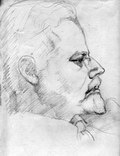
That's where the real work of preserving KPFA's heritage takes place. This website is a sort of wrecker's yard, allowed by its indulgent parent to survive on what it can scavenge from the ruins of history.
The PACIFICA I knew is now IN EXILE

Throughout the 1960s I worked intermittently for Berkeley's non-commercial listener-supported FM station KPFA, including four years full time as its Production Director. Worked? It was more like being thrust into a round-the-clock play pen bursting with obstreperous child prodigies. But out of this chaos came many programs to rival the BBC’s — and for a single-digit percentage of the cost.
Whole volumes have been written about Pacifica Radio’s internecine warfare, but very little about what was actually going out over the air while the blood was flowing. This website does not aim to redraw the battle lines, but consists primarily of programs from the 60s of which I still have playable copies, together with long, informative, inspiring and frequently amusing conversations I recorded in 1994 with over two dozen of the network’s original founders, programmers and supporters. (At least five of them have since passed on to the Great Studio in the Sky).
If you're a seeker after soundbites, you had best click on X and be on your way. When KPFA’s staff went on the air in 1949, the first thing they did was to rip the clocks off the walls (literally!). It was Rabelais’ Abbey of Theleme come to life, and the station's formidably erudite founder Lew Hill would instantly have acknowledged this living metaphor. These are distant echoes from a "laid back" era — as John Cage said of Tibetan chant, if you find it boring perhaps you haven’t been listening long enough.
John Whiting
How this site came about
As my contemporaries die off, I become increasingly concerned about what
I’ll leave behind — not my reputation but my legacy, i.e. whatever might be as useful as, say, a rusty pot to a castaway on a desert island. In 1990 I was asked to write a monograph about KPFA's early history for a Danish scholarly journal. The result was “The Lengthening Shadow: Lewis Hill and the Origins of Listener-Sponsored Radio in America". Its readers urged me to expand it into a book, and so in 1994 I extended a concert gig in Canada into a research trip across the US. As I talked to the station's aging survivers, I became convinced that the book should include a CD-ROM with selections both from the interviews I'd recorded and from representative KPFA programs. But no agents or publishers were interested, and I couldn’t take a couple of years off from my work as a sound designer to write it on spec, and so the tapes gathered dust in the attic.
And then in 2008 I attended a workshop on media documentation at the British Library, in the course of which I learned that what I had was not just a box of old tapes, but an Archive of Oral History — one of the trendiest things going! Running up to three-and-a-half hours each, were they too long? The BL's Lead Content Specialist doesn't feel that she's doing her job properly with less than thirty-six!
I also had tapes of many of the programs I had produced or worked on, together with a few others I'd chosen to keep. Here they are in mp3 format, freely available for streamed listening, subject to the usual "fair use" restrictions. You are invited to turn off your BlackBerry and pass through these Stygian portals into living history!
|
Pacifica Sampler In 1961 KPFA offered its subscribers a Christmas LP with a representative sample of the programs it had presented during its first dozen years. The enormous variety is all here: original music, poetry, commentary, drama, documentary, philosophy, humor — and a lecture by Marilyn Monroe's psychiatrist!
|
Public Affairs Public affairs programming, though not necessarily the largest segment of the broadcast schedule, was nevertheless the most influential. KPFA not only reported history, but sometimes helped to make it. A jewel in the crown was Freedom Now!, Dale Minor's stirring report from the civil rights barricades in Birmingham, Alabama. |
|
MusicThese pages include a few music programs from the 60s with which I was intimately involved and which are too good to die. Among others, there are programs by Anthony Boucher and Phil Elwood, a studio recital by Jorg Demus, and a feature on San Francisco Opera's 1963 production of Richard Strauss's Capriccio that includes interviews with Elizabeth Schwartzkopf, Hermann Prey and Thomas Stewart.
|
Drama and Literature These pages include the thirty-odd episodes of Erik Bauersfeld's Black Mass for which I did the technical production. Together we were credited in a PhD dissertation with having "kept radio drama alive in America in the 1960s". Also featured are Ghelderode's Red Magic (the only opportunity I had of working with KPFA's legendary director Virginia Maynard) and Paul Piehler's three-hour dramatic adaptation of Sir Gawain and the Green Knight in Middle English, which for years was given an annual Christmas airing. Elitist? You betcha!
|
|
ConversationsEven though my book about KPFA's programming never interested a publisher, it nevertheless provided the impetus for half-a-hundred hours of conversation with two dozen of the names inexorably linked to KPFA's history. Coast to coast, I chatted amiably with retired warriors who had sometimes been at each other's throats but had still found time to produce great programs. |
History Having been a modest part of KPFA's history, I venture occasionally to write about it.
When KPFA was new On April 15, 1974, exactly twenty-five years after KPFA went on the air, Larry Josephson hosted Pacifica is 25 to celebrate the event. It remains the best single embodiment of the new station's ethos and aesthetics. |


